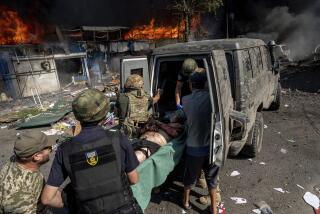Americans Embark on Person-to-Person Soviet Peace Walk
- Share via
LEESBURG, Va. — Today 230 Americans are scheduled to arrive in Leningrad and meet their Soviet counterparts in the American/Soviet Walk from Leningrad to Moscow, which begins later this week.
Orientation and training were completed here Saturday on the grounds of a rural boarding school. Walkers wrapped up their sleeping bags, folded their tents and tried to make their gear look like the airlines’ regulation two pieces of luggage. They left for Leningrad in two waves, one group leaving Saturday and stopping in Ireland, the other flying directly to Leningrad late Sunday on an Aeroflot charter.
On one level the walk promises to be a great adventure, and the Americans have been approaching it with predictable excitement and exuberance. But there is also a sense of high purpose and importance.
During the seven months of planning, the organizers have been saying the walk is about “ending an arms race nobody wants.”
For many of the participants, this is an important example of citizen diplomacy, and they hope the Soviets see it the same way. Others see it as going beyond grass-roots politics to a spiritual odyssey that is potentially momentous.
The Americans have been preparing for their journey with a sense of import that may rival the great crusades of history. In the course of the week’s training, especially as departure drew near, the anticipation of impending adventure and historic mission were inseparable. People were milling around, some hugging each other, a few occasionally bursting into tears, others grinning, squeezing each other, saying: “It’s happening.”
As the first wave waited to stow their baggage on the bus to the airport, Jolene DeLisa of Hawaii was wearing a lavender-silk lei. She will leave it in the Soviet Union, she said, and hopes to put it over the head of Raisa Gorbachev, wife of the Secretary General and the Soviet Union’s First Lady.
Indeed, they will all arrive bearing gifts for the people they meet along the way. Along with the simple and predictable token items, such as perfume samples and pens, there are more than 4,000 handmade “show-and-tell” items collected from people across the country. Coordinated by peace walker Mary Edwards of Prescott, Ariz., they are mementos of little material value. Instead, they are almost desperately simple pleas for peace and friendship.
One of the many speakers who briefed walkers was William Courtney, a career diplomat from the State Department, who served in Kiev. He came after dinner on Thursday, and the walkers, in shorts and jeans, sprawled on the lawn of a 200-year-old log cabin. Courtney stood.
In a week filled with differing perspectives, this occasion--the only involving a U.S. government official--provoked the most negative reaction. Exchanges were not only heated; at times they were downright hostile, with hissing when he mentioned the Star Wars or Strategic Defense Initiative, derisive laughter when he said it was necessary to keep testing nuclear weapons to make them safer and angry outbursts when he called the contras in Nicaragua “freedom fighters.”
Some took him on and told him off, while others rose in distress to remind the rest that the man was their guest.
Through it all, Courtney remained unflappable, unperturbed and clearly saw it as all in the line of duty. They simply disagreed on policy as far as he was concerned, Courtney said, and they have the right to do so in a free society.
Throughout much of the next day, including some of the formal sessions in group dynamics, people evaluated and re-evaluated what had happened, partly out of concern that the same thing would happen in the Soviet Union.
On the day before departure, they formed a circle around a lantern lit from the Eternal Flame that burns at the Hiroshima Peace Garden on the ground.
When time came for the first wave to go: More hugs, tears and laughter. An emotional leave-taking for people who expected to be together in two days. But together over there.
“See ya’ in Leningrad.” “Take care, man.”
More to Read
Sign up for Essential California
The most important California stories and recommendations in your inbox every morning.
You may occasionally receive promotional content from the Los Angeles Times.













